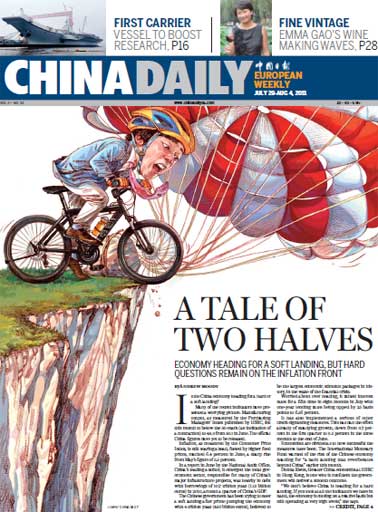Monetary house of cards
Updated: 2011-07-29 11:37
By Fan Ying (China Daily European Weekly)
Asian countries should heed lessons of sovereign debt crisis in Europe and be prudent about adopting a single currency
 |
With a debt crisis emerging in Italy, the third largest European economy and the world's seventh largest, the eurozone sovereign debt crisis that broke out at the end of 2009 is clearly escalating rather than subsiding. Its effects, if unchecked, will likely stunt the development of eurozone countries and the European Union (EU) as a whole.
European countries' rush to push for economic integration disregarding their specific individual conditions has served as the main cause of the current debt crisis in some EU countries.
The gradual integration of European countries that began in the late 1950s played a positive role in helping Europe's economy recover from World War II, but the later accelerated momentum, which led to the birth of the euro as the single eurozone currency in 2002, has since caused fierce debates between proponents and opponents of European integration.
While the creation of a eurozone at a time when the world's economy was generally stable did reduce trade barriers and transaction costs between member nations, the existence of ever-growing economic, political and social variations among eurozone countries has increased the difficulties for economic policy coordination among members and thus undermined their ability to cope with the crisis.
Under the single currency, eurozone countries have to hand over their monetary decision-making to the European Central Bank (ECB), but at the same time they can implement comparatively independent financial policies. As a result, eurozone countries have fallen short of an effective economic regulatory method and failed to strengthen monetary and financial policy coordination.
Despite the ECB's efforts to stabilize prices as its primary monetary policy target, the euro exchange rate still fluctuates in accordance with the supply-demand of the international currency market. Such a policy has indirectly removed the capability of individual eurozone countries to utilize the exchange rate to their advantage. This, together with its inability to strengthen financial and monetary policy coordination among member states, has made it hard for the ECB to stabilize the euro. The adoption of a supra-sovereign currency among mutually independent EU countries remains a fundamental dilemma for the euro.
The lack of an effective monitoring and regulatory regime is the direct cause of the current eurozone sovereign debt crisis. With the birth of the euro, EU countries passed an agreement stipulating that the fiscal deficit in eurozone countries should not exceed 3 percent of their gross domestic product (GDP) and the total sovereign debt should not exceed 60 percent of their GDP. However, the lack of an effective monitoring mechanism produced huge divergences among member states, resulting in the failure of some to abide by the accord. The lack of punitive measures for those that do not abide by the accord has facilitated these violations.
The lack of a highly efficient mutual assistance mechanism has also fueled the spread of the eurozone sovereign debt crisis. Upon the creation of the euro, there was a regulation that ruled out offering assistance among eurozone countries at any time except for the occurrence of natural disasters or irresistible situations. The regulation also opposed member states seeking help from international bodies. This regulation has caused other countries to stand by as countries struggle with a debt crisis. This probably means that the best chance to give a helping hand to those countries in need has been lost and enabled the crisis to spread.
The problems that have plagued Europe's monetary integration since the onset of the global financial crisis offer a stark lesson to Asian countries endeavoring to promote monetary integration.
The crisis in Europe shows that there are always potential risks for any region that implements a single currency among countries that have huge economic, monetary, social, historical, cultural and religious differences. This is particularly the case in Asia, where the differences among countries are much greater than those among European countries.
From such a perspective, Asian countries should not forge monetary alliances in their bid to promote financial cooperation. Instead, they should push for integration in their financial markets and the establishment of a corresponding monitoring regime.
Asian countries should also establish a self-restrained fiscal deficit system. Unchecked fiscal deficits, once exceeding a level that causes qualitative changes, will create the possibility of a debt crisis, especially in the context of an unstable international economic environment.
In their pursuit of greater financial cooperation, Asian countries should also set up an effective monitoring and regulatory system and mutual assistance mechanism. Such measures should effectively punish countries that exceed the agreed debt level and at the same time, cultivate an "Asia consciousness" that will encourage a country to offer timely help to another in times of need.
In addition, Asian countries should abide by the principle of mutual political and economic coordination in a bid to cultivate a strong force for steady regional cooperation.
Prudence in forging a single Asian currency in the foreseeable future does not mean their financial cooperation should stop. Instead, it means Asian countries should accelerate regional trade, investment and financial cooperation to better serve Asian integration and its sustainable development.
The author is an economics professor with the Foreign Affairs College.
E-paper

Ringing success
Domestic firms make hay as shopping spree by middle class consumers keeps cash registers ringing in Nanjing
Mixed Results
Crowning achievement
Living happily ever after
Specials

Ciao, Yao
Yao Ming announced his retirement from basketball, staging an emotional end to a glorious career.

Going the distance
British fitness coach comes to terms with tragedy through life changes

Turning up the heat
Traditional Chinese medicine using moxa, or mugwort herb, is once again becoming fashionable
